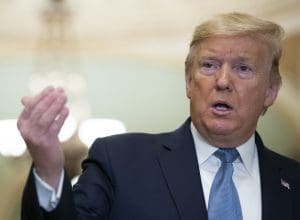Trump finally decides fighting coronavirus might be as important as his wall
The Trump administration has mostly downplayed the severity of the ongoing COVID-19 outbreak.

The American Hospital Association, American Nurses Association, and American Medical Association have all urged Donald Trump to declare the COVID-19 outbreak a national disaster or emergency under the Stafford Act or National Emergencies Act.
By Friday morning, Trump finally appeared ready to do so.
In a joint letter on Thursday, the groups argued that this step would better allow the federal government “to ensure that health care services and sufficient health care items are available” to respond to the crisis. Such a move would allow FEMA to take action and make it easier for programs like Medicare, Medicaid, and the Children’s Health Insurance Program to support communities.
On Friday, Bloomberg reported that Trump has at last reluctantly agreed to declare and emergency.
“Trump plans to declare a national emergency over the coronavirus outbreak, invoking the Stafford Act to open the door to more federal aid for states and municipalities,” senior White House reporter Jennifer Jacobs tweeted.
Last week, Trump said declaring a national emergency would be premature. “I don’t think you’ll need that, because I really think we’re in extremely good shape,” he claimed last Monday. “We’re prepared for anything. And we can always do that at a later date if we need it.”
On Thursday, news reports suggested an emergency declaration was imminent, but Trump demurred. “I don’t want to say that, but you know, at some point,” he told reporters when asked if an order was coming.
Politico reported on Wednesday that Trump has resisted calling the current outbreak an emergency because it would undermine his attempts to downplay the crisis and pretend everything is under control.
“The president isn’t persuaded because [an emergency declaration] contradicts his message that this is the flu,” a Trump confidant told the paper.
A former Homeland Security official added that the administration worried the “optics of national emergency” could hurt the stock market, tourism, and travel.
Trump’s delayed action on the virus stands in stark contrast to his decision to issue an emergency declaration last February about the southern border. “The current situation at the southern border presents a border security and humanitarian crisis that threatens core national security interests and constitutes a national emergency,” he wrote. He claimed that action gave him the power to take billions of dollars from defense programs to pay for his wall.
The White House did not immediately respond to a request for comment about the delay.
The Centers for Disease Control and Prevention has reported more than 1,200 coronavirus cases and 36 deaths in the United States already. Experts believe hundreds of thousands of others may be undiagnosed, as so few people have been tested.
Trump, meanwhile, took to Twitter late Thursday to mock the Obama administration for taking too long to declare a national emergency over the 2009 H1N1 swine flu.
“President Obama made changes that only complicated things further,” he tweeted. “Their response to H1N1 Swine Flu was a full scale disaster, with thousands dying, and nothing meaningful done to fix the testing problem, until now.”
He claimed “changes have been made” since then and suggested more coronavirus testing would “soon happen on a very large scale basis.”
“All Red Tape has been cut, ready to go!” he wrote.
Published with permission of The American Independent Foundation.
Recommended

Biden campaign launches new ad focused on Affordable Care Act
Former President Trump has said he wants to do away with the popular health care law.
By Kim Lyons, Pennsylvania Capital-Star - May 08, 2024
Ohio doctors fear effects of emergency abortion care case set to go before U.S. Supreme Court
A federal law that allows emergency departments to treat patients without regard to their ability to pay will be under U.S. Supreme Court scrutiny this week, and Ohio doctors are concerned about the case’s local impact on emergency abortion care.
By Susan Tebben, Ohio Capital Journal - April 23, 2024
House GOP votes to end flu, whooping cough vaccine rules for foster and adoptive families
A bill to eliminate flu and whooping cough vaccine requirements for adoptive and foster families caring for babies and medically fragile kids is heading to the governor’s desk.
By Anita Wadhwani, Tennessee Lookout - March 26, 2024









































































